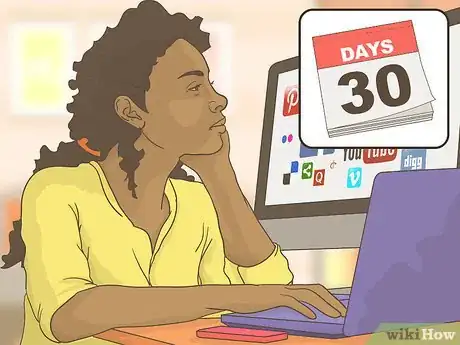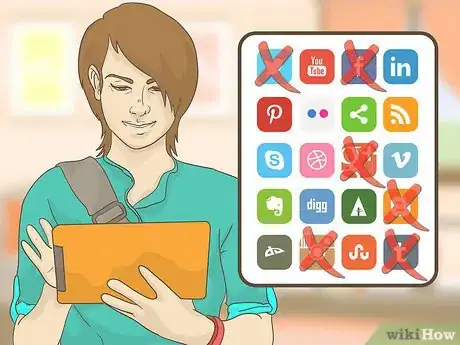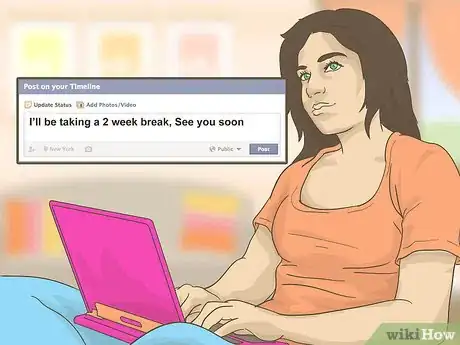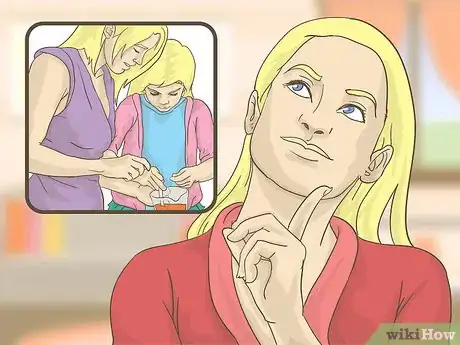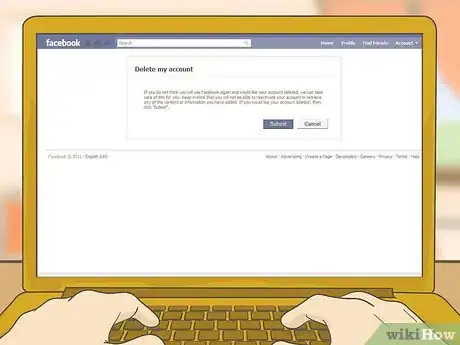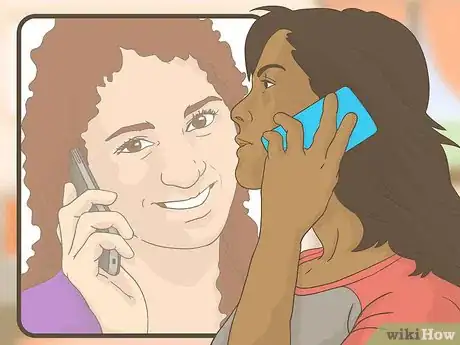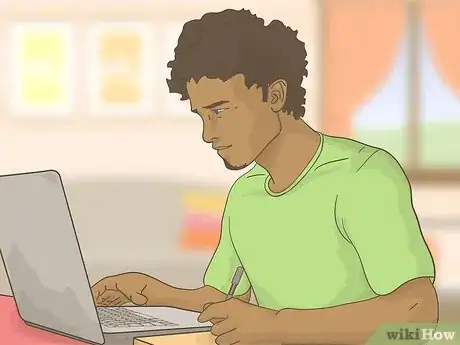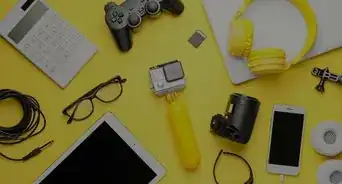This article was co-authored by Annie Lin, MBA. Annie Lin is the founder of New York Life Coaching, a life and career coaching service based in Manhattan. Her holistic approach, combining elements from both Eastern and Western wisdom traditions, has made her a highly sought-after personal coach. Annie’s work has been featured in Elle Magazine, NBC News, New York Magazine, and BBC World News. She holds an MBA degree from Oxford Brookes University. Annie is also the founder of the New York Life Coaching Institute which offers a comprehensive life coach certification program. Learn more: https://newyorklifecoaching.com
There are 9 references cited in this article, which can be found at the bottom of the page.
This article has been viewed 123,645 times.
Taking a break from social media is a great way to reconnect with the people and activities that really motivate you. Before logging off, identify why you wish to take a break. Select the duration of the break, the networks you want to temporarily abandon, and develop a schedule for reducing your social media use. To help you maintain your break, turn off social media notifications or delete the apps entirely. Use the time you’d otherwise be on social media to read, exercise, and spend time with your friends and family.
Steps
Logging Off
-
1Decide how long you want to take a break from social media. There’s no right or wrong period of time you should spend off of social media. The choice is entirely yours. You could choose to spend 24 hours off of social media, or you might spend 30 days off social media (or more).
- Don’t feel locked into the period of time you’ve decided to stay off social media. If you get to the end of your social media-free period and find you wish to continue your break, do so.
- On the other hand, you can also shorten your social media break if you feel that you’ve accomplished whatever it is you wanted to accomplish by taking a social media break.
-
2Choose when to take a break. The best time to take a break from social media is during family vacations and holidays. This will give you and your family the opportunity to spend time each other in conversation rather than engaging in social media exchanges.[1]
- But you might also take a break from social media if you need to commit all your attention to someone or something – for instance, when working on a school project.
- If you’re feeling overwhelmed due to bad news and political mudslinging on social media, you might also take a social media break. You can look for clues that this is happening to you. For example, do you feel irritable after looking at social media? Do you fixate on things that you saw and think about them for the rest of the day? Do you have trouble focusing afterward? If so, then you probably need to take a break.
Advertisement -
3Choose the networks you want to take a break from. Taking a social media break could mean a cessation of all social media use, or it could mean taking a break only from certain networks. For instance, perhaps you temporarily quit Facebook and Twitter, but stay on Instagram.
- There are no right or wrong ways to choose the networks you wish to take a break from. A good way to start the selection process, though, is to think about your reasons for desiring a social media break, and then take a break from the network or networks that will most directly allow you to achieve those goals.
- You can also just log out of these sites and applications on your computer and phone. Having to log in every time you visit the site or use the app may reduce the chance that you will check them whenever you get bored or distracted.
-
4Develop a schedule to gradually cut back on your social media use. For instance, if you plan on taking a social media break between Christmas and New Year’s Day, work to reduce your social media use in the period prior to Christmas. Start cutting back about 10 days before you intend to take your break. The amount by which you cut back depends on how much you use social media.[2]
- For instance, if you use social media for two hours daily, cut your social media use back to 1.5 hours 10 days prior to your break. Then, seven days before you plan on initiating your social media break, cut down to one hour daily. Four days prior to your break, cut back to 30 minutes daily.
-
5Let your friends and family know you’ll be taking a break. During your period of decreasing social media use, you might want to let your friends and social media followers know that you will soon be taking a social media break. This will let people know why you aren’t answering their messages and prevent them from worrying once your social media break begins.[3] It will also help to keep you accountable whenever you pull out your phone and start to open the app.
- If you wish, you could schedule posts to appear even while you’re taking a break.[4] There are third-party apps that allow you to schedule your posts on Instagram, Facebook, and other social media platforms.
-
6Remind yourself why you are taking a break. Without a good cause, you will have a hard time maintaining time away from social media. There are many reasons you might want to temporarily quit social media. Perhaps you want more time with your friends and family. Perhaps you are tired of using it every day. Whatever your reason, be able to clearly articulate it so that you can answer people who ask – because they ‘’will’’ ask.
- You may also want to keep a list handy to remind yourself why you are taking a break from social media.
- It’s also important to be able to identify why you want a social media break in order to stay strong when you start to feel that you do not want to continue. In those moments, you can remind yourself, “No, I refuse to use social media until my designated break period ends because I want to spend more time with my family.”
EXPERT TIPIf you feel depleted, lethargic, envious, or anxious after you use social media, you probably need a break.
Annie Lin is the founder of New York Life Coaching, a life and career coaching service based in Manhattan. Her holistic approach, combining elements from both Eastern and Western wisdom traditions, has made her a highly sought-after personal coach. Annie’s work has been featured in Elle Magazine, NBC News, New York Magazine, and BBC World News. She holds an MBA degree from Oxford Brookes University. Annie is also the founder of the New York Life Coaching Institute which offers a comprehensive life coach certification program. Learn more: https://newyorklifecoaching.com
Annie Lin, MBA
Life & Career Coach Annie Lin, MBA
Annie Lin, MBA
Life & Career Coach
Staying Off
-
1Deactivate your account. For instance, if you typically access social media on your phone, delete the apps from your phone.[5] If you tend to use social media on your computer, keep your computer turned off for the duration of your break from social media. A less extreme alternative is to simply turn off social media notifications on your device of choice so that you are not tempted to look.
- If you turn off notifications, be sure to turn off email notifications, too.
-
2Delete your account. If you find that you’re fitter, happier, and more productive during your social media break, you might want to extend the break to a full-time social media deletion. In this case, you’ll say goodbye to social media for good.[6]
- The process for deleting your account varies with social media platform. Typically, it’s quick and easy, and requires simply navigating the user menu options to the section dealing with your account (which is usually called “Your Account”). From there, just click “Delete My Account” (or some similar prompt) and confirm your decision.
- Remember, if you ever want to hop on a particular social media platform again later, you can, though you’d be starting from scratch.
-
3Reframe the decision to take a break from social media. It’s easy to think of taking a break from social media as the exclusion of something. But instead, consider your time without social media as a liberation from the demands you may have unconsciously placed on yourself to constantly post new content and engage in social media interactions. Instead of posting on social media, you can now simply focus on enjoying whatever it is you’re doing wherever it is you are.[7]
- Try keeping a mini journal with you and write in it whenever you notice that your day has been better than it usually is when you are always checking social media.
-
4Distract yourself to get through the hard part. There will probably be a few days where you really miss being on social media. But after a time – three days, five days, or even a week depending on how connected you are to social media use – you’ll begin to feel the urge to use social media decline. Stay strong through this rough period and know that it will pass. There are several ways to avoid temptation and temporary depression. For instance, you could:[8]
- See a movie with friends
- Catch up on your reading by grabbing a book off the shelf
- Take up a new hobby like bicycle repair or playing the guitar.
-
5Recognize the contrived nature of social media content. On social media, many people post only their best-looking photos and rarely – if ever – posts negative things about their lives. Once you see past this carefully calculated veneer of perfection, you will begin feeling more alienated from and skeptical of the whole enterprise. This sense of alienation will make you more willing to take a break from social media.[9]
-
6Think before resuming your social media use. If you do decide that you want to resume using social media at some point, then you might want to take some time to consider your decision. Make a pros and cons list to help you identify your reasons for wanting to resume your social media use.
- For example, your pros might include things like “stay up to date about what friends are doing,” “have a place to share my good news and pictures,” and “engage in conversations with friends about interesting news.” However, your cons might include things like “get frustrated by political posts,” “waste time by checking my account too often,” and “worry unnecessarily over things I’ve posted.”
- Compare your pros and cons to help you decide which option has the greatest benefit and make your decision.
- You may also want to place some firm limits on yourself if you do resume your social media use. For example, you might set aside two 15 minute time frames per day to engage on social media and stay logged out of your accounts at all other times.
Finding Substitute Activities for Social Media Use
-
1Connect with your friends outside of social media. Social media is not the only way to stay in contact with people. Instead of getting updates about what your friends are up to via social media, give them a call or send them an email or text message.[10] Ask them, “What are you up to later? Would you like to grab some pizza and hang out?”[11]
-
2Meet new people. Without the constant instinct to check social media, you’ll be more engaged in the world around you. Strike up a conversation with your seatmate on the bus. “Lovely weather today, isn’t it?” you might say.[12]
- You could also get involved in your community. Look up local charities or nonprofit organizations that offer volunteer opportunities. You might be able to volunteer at your local soup kitchen, food bank, or home-building organization (like Habitat for Humanity).
- Check out local clubs and groups on Meetup.com. The site allows people to connect and share their favorite interests, including movies, books, and meals. If you don’t see a group you’re interested in, start one of your own!
-
3Read a newspaper. Social media isn’t just a great tool for communicating and seeing what others are doing. It is also often a primary mode of getting the news. But even without social media, you can stay informed. To read the day’s news, read a newspaper, visit the site of your favorite news purveyor, or grab a periodical covering current events from your local newsstand.[13]
-
4Catch up on your reading. Many people have a long backlog of books they promised themselves they’d get to “someday.” Now that you’re taking a break from social media, your “someday” has arrived. Settle into a cozy chair with a mug of warm tea and one of the books that seem most interesting to you.
- If you like reading but don’t have books of your own to read, visit your local public library and check out a few volumes that seem interesting.
-
5Organize your house. Dust, vacuum, and do the dishes. Go through your closet and identify clothes that you don’t wear anymore. Take them to the secondhand store for donation. Go through your books, movies, and games and look for ones that you’re willing to part with. Put them up for sale on Craigslist or eBay.
-
6Take care of business. Use time that you’d otherwise devote to browsing social media to reply to your other correspondence (email or voicemail). Get started on school projects or catch up on your homework. If you work from home, use social media time to locate new clients or revenue streams.[14]
-
7Be thankful for what you have. Take stock of everything and everyone in your life that you’re thankful for. For instance, make a list of friends and family who are always there for you when you’re down. Make another list of your favorite things or places – your local library, for instance, or your game collection. This will redirect your attention from social media and make it easier to take and maintain your break from it.[15]
Expert Q&A
-
QuestionHow do you know it's time to take a break from social media?
 Annie Lin, MBAAnnie Lin is the founder of New York Life Coaching, a life and career coaching service based in Manhattan. Her holistic approach, combining elements from both Eastern and Western wisdom traditions, has made her a highly sought-after personal coach. Annie’s work has been featured in Elle Magazine, NBC News, New York Magazine, and BBC World News. She holds an MBA degree from Oxford Brookes University. Annie is also the founder of the New York Life Coaching Institute which offers a comprehensive life coach certification program. Learn more: https://newyorklifecoaching.com
Annie Lin, MBAAnnie Lin is the founder of New York Life Coaching, a life and career coaching service based in Manhattan. Her holistic approach, combining elements from both Eastern and Western wisdom traditions, has made her a highly sought-after personal coach. Annie’s work has been featured in Elle Magazine, NBC News, New York Magazine, and BBC World News. She holds an MBA degree from Oxford Brookes University. Annie is also the founder of the New York Life Coaching Institute which offers a comprehensive life coach certification program. Learn more: https://newyorklifecoaching.com
Life & Career Coach If you feel depleted and lethargic after using social media, or you feel envious and anxious that you’re not where you should be in life, you probably need a break.
If you feel depleted and lethargic after using social media, or you feel envious and anxious that you’re not where you should be in life, you probably need a break.
References
- ↑ https://www.theguardian.com/commentisfree/2016/dec/04/social-media-election-donald-trump-wellbeing
- ↑ https://www.psychologytoday.com/blog/fulfillment-any-age/201108/5-steps-breaking-bad-habits
- ↑ http://www.forbes.com/sites/jaysondemers/2014/08/06/need-a-break-from-social-media-heres-why-you-should-take-one/#708856506b34
- ↑ http://www.forbes.com/sites/jaysondemers/2014/08/06/need-a-break-from-social-media-heres-why-you-should-take-one/2/#ff425fa65b22
- ↑ http://witanddelight.com/2014/10/cultural-conditional-add-social-media-melting-brains/
- ↑ https://www.nytimes.com/2014/07/03/technology/personaltech/swear-off-social-media-forever-or-just-for-now.html
- ↑ https://socialmediaweek.org/blog/2016/07/break-from-social-media-summer/
- ↑ http://witanddelight.com/2014/10/cultural-conditional-add-social-media-melting-brains/
- ↑ https://socialmediaweek.org/blog/2016/07/break-from-social-media-summer/
- ↑ http://www.lifehack.org/318316/8-things-that-will-happen-you-break-with-social-media
- ↑ https://socialmediaweek.org/blog/2016/07/break-from-social-media-summer/
- ↑ https://www.theguardian.com/commentisfree/2016/dec/04/social-media-election-donald-trump-wellbeing
- ↑ https://www.theguardian.com/commentisfree/2016/dec/04/social-media-election-donald-trump-wellbeing
- ↑ http://www.lifehack.org/318316/8-things-that-will-happen-you-break-with-social-media
- ↑ https://socialmediaweek.org/blog/2016/07/break-from-social-media-summer/
